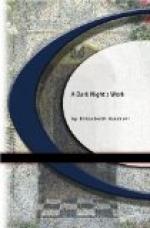“I am very ill. I sometimes think I shall never get better, so I wish to ask your pardon for what I said the night before I was taken ill. I am afraid my anger made mischief between you and Ellinor, but I think you will forgive a dying man. If you will come back and let all be as it used to be, I will make any apology you may require. If I go, she will be so very friendless; and I have looked to you to care for her ever since you first—” Then came some illegible and incoherent writing, ending with, “From my deathbed I adjure you to stand her friend; I will beg pardon on my knees for anything—”
And there strength had failed; the paper and pencil had been laid aside to be resumed at some time when the brain was clearer, the hand stronger. Ellinor kissed the letter, reverently folded it up, and laid it among her sacred treasures, by her mother’s half-finished sewing, and a little curl of her baby sister’s golden hair.
Mr. Johnson, who had been one of the trustees for Mrs. Wilkins’s marriage settlement, a respectable solicitor in the county town, and Mr. Ness, had been appointed executors of his will, and guardians to Ellinor. The will itself had been made several years before, when he imagined himself the possessor of a handsome fortune, the bulk of which he bequeathed to his only child. By her mother’s marriage-settlement, Ford Bank was held in trust for the children of the marriage; the trustees being Sir Frank Holster and Mr. Johnson. There were legacies to his executors; a small annuity to Miss Monro, with the expression of a hope that it might be arranged for her to continue living with Ellinor as long as the latter remained unmarried; all his servants were remembered, Dixon especially, and most liberally.
What remained of the handsome fortune once possessed by the testator? The executors asked in vain; there was nothing. They could hardly make out what had become of it, in such utter confusion were all the accounts, both personal and official. Mr. Johnson was hardly restrained by his compassion for the orphan from throwing up the executorship in disgust. Mr. Ness roused himself from his scholarlike abstraction to labour at the examination of books, parchments, and papers, for Ellinor’s sake. Sir Frank Holster professed himself only a trustee for Ford Bank.
Meanwhile she went on living at Ford Bank, quite unconscious of the state of her father’s affairs, but sunk into a deep, plaintive melancholy, which affected her looks and the tones of her voice in such a manner as to distress Miss Monro exceedingly. It was not that the good lady did not quite acknowledge the great cause her pupil had for grieving—deserted by her lover, her father dead—but that she could not bear the outward signs of how much these sorrows had told on Ellinor. Her love for the poor girl was infinitely distressed by seeing the daily wasting away, the constant heavy depression of spirits, and she grew impatient of the continual pain of sympathy. If Miss Monro could have done something to relieve Ellinor of her woe, she would have been less inclined to scold her for giving way to it.




